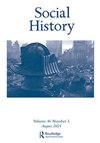The quiet violence of colonialism and the uncertainty of illegibility: emotions and experiences of the deportable in Mandate Palestine
IF 1.1
1区 历史学
Q1 HISTORY
引用次数: 1
Abstract
ABSTRACT Deportations of socio-economically marginal migrants are a form of quiet, non-brutal violence. This violence is not spectacular nor does it typically cause immediate injury or death. Building on histories of immigration and deportation, research on structural violence in colonial settings and critical studies of affect and emotion, this article considers how the deportation regime in the interwar Middle East and specifically in Palestine affected precarious migrants. During the interwar years in mandate Palestine, quiet colonial violence came to guide emotional and affective encounters between the British-run administration and the migrants it deemed illegible. Focusing on the condition of deportability, inscribed upon migrants who could not present identity documents or prove their legible existence in Palestine, this article foregrounds the framing of the colonial state as an object of emotional investment for these migrants. For refugees, the displaced, orphans, single women and labour migrants who were in Palestine without permission, deportability was an embodied and affectively charged condition of being. The article argues that existence in the colonial state was entirely contingent on being legible. Being illegible, then, was to be open to the quiet violence of colonialism. It considers how the archive presents the voices of deportable migrants and their often ordinary cross-border trajectories.殖民主义的无声暴力和难以辨认的不确定性:托管巴勒斯坦中被驱逐者的情感和经历
驱逐社会经济边缘移民是一种安静的、非野蛮的暴力形式。这种暴力并不引人注目,也通常不会立即造成伤害或死亡。基于移民和驱逐出境的历史,对殖民环境中结构性暴力的研究以及对情感和情感的批判性研究,本文考虑了两次世界大战之间中东,特别是巴勒斯坦的驱逐制度如何影响不稳定的移民。在两次世界大战之间的巴勒斯坦托管时期,安静的殖民暴力开始引导英国政府与它认为难以辨认的移民之间的情感和情感接触。这篇文章关注的是那些无法出示身份证件或证明自己在巴勒斯坦存在的移民被驱逐出境的情况,并将殖民国家的框架作为这些移民情感投资的对象。对于未经许可进入巴勒斯坦的难民、流离失所者、孤儿、单身妇女和劳工移徙者来说,驱逐出境是一种具体和实际的存在条件。这篇文章认为,殖民地国家的生存完全取决于字迹是否清晰。因此,难以辨认就意味着对殖民主义的无声暴力持开放态度。它考虑了档案如何呈现被驱逐移民的声音以及他们通常的跨境轨迹。
本文章由计算机程序翻译,如有差异,请以英文原文为准。
求助全文
约1分钟内获得全文
求助全文
来源期刊

Social History
HISTORY-
CiteScore
1.10
自引率
0.00%
发文量
37
期刊介绍:
For more than thirty years, Social History has published scholarly work of consistently high quality, without restrictions of period or geography. Social History is now minded to develop further the scope of the journal in content and to seek further experiment in terms of format. The editorial object remains unchanged - to enable discussion, to provoke argument, and to create space for criticism and scholarship. In recent years the content of Social History has expanded to include a good deal more European and American work as well as, increasingly, work from and about Africa, South Asia and Latin America.
 求助内容:
求助内容: 应助结果提醒方式:
应助结果提醒方式:


